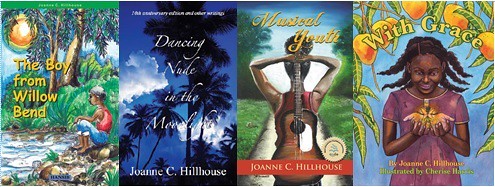Once I realized that With Grace was turning out to be a fairytale, I did not resist it...but I did do my best to subvert the tropes of the genre.
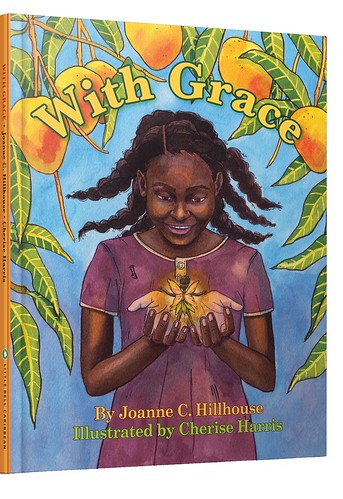
Why didn't I resist, though not strictly speaking a children's writer (I had only one previous children's book among five to my credit)? Because as a writer, I enjoy wrestling with genres I've never attempted before – even if that cage match is to be within the deceptively simple and straightforward world of 'once upon a time' where they 'all lived happily ever after'. Also, as a long time dreamer and reader, it was joyful to revisit the genre that helped me fall in love with stories in the first place.
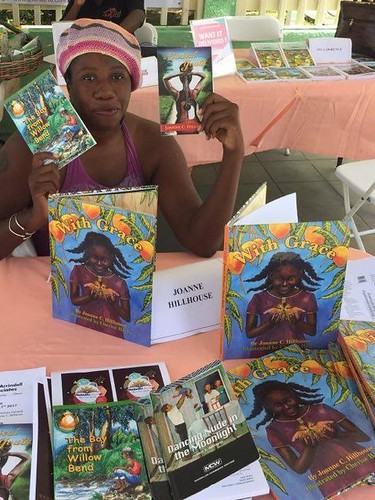
Author Joanne Hillhouse - a moment from a local fair held in recognition of World Intellectual Property Rights Day, April 26th 2017
So, why subvert? Because for all the ways it helped open up my imaginative pathways, the fairytales of my childhood did their share of inadvertent damage, as well. While every race and culture has its own fairytales, as a black girl coming of age in the Caribbean, in the retellings that were popular in my part of the world, I was never a part of the story nor was anyone who looked like me. Also, unlike the women I saw in real life, the girls in the fairytales were invariably in need of rescuing, usually by a Prince (or the Prince was in some way the pathway to happiness). I'm not going to do a deep dive in to feminist and racial and cultural and problematic in many other ways readings of Western fairytales, but I will say that as With Grace, my own Caribbean faerie tale, revealed itself to me, I wanted to tell a different story. I say revealed because, let me be clear, it was never my intention to be heavy-handed; whatever rebellion was to happen had to happen naturally. My primary goal was to tell a good and engaging children's story. I hope I've done that. But a writer can have secondary goals.
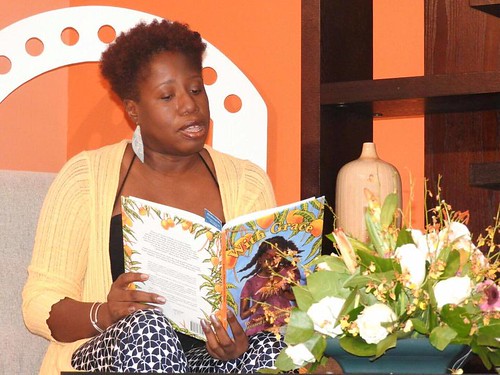
Author Joanne Hillhouse at a January 2017 appearance on a local morning show reading from With Grace. The show is Good Morning Antigua Barbuda on ABS TV.
So, my main characters (I won't say heroines or villains) were not going to be pale and flaxen-haired but with "skin, deep brown like the top-soil used for growing things" with "raggedy rows of single plaits"– and beautiful in their natural selves. When I saw the cover, it was like the character had leaped from my mind to the tip of illustrator Cherise Harris' pen (though not a word had passed between us). I hope that even before opening the book, young girls who rarely or never see themselves can see themselves in her and see that they are beautiful (as research like the widely shared doll test remind us, they can't hear this enough).
Also, while With Grace has magic, my version of the fairy godmother (à la Disney's Cinderella) is the obeah man. Brought here by enslaved Africans and believed to be a variation of/extract from the spirituality practiced on the motherland and dispersed under different names throughout the diaspora, obeah 'enjoyed' outlaw status (it is literally still against the law here in Antigua, not the only remnant of colonial law). Challenging the established narrative, I chose to interpret it, in this writing, as magic –no more evil or good than the Euro-approved magic in your average fairytale. The book's glossary describes the obeah man as an "herbalist, natural medicine practitioner, village psychologist, and master of spells for good or wicked deeds." In the book, I further invert the idea of magic as this nebulous thing outside of our control, re-imagining it as something that lives within, driven and directed by intent. So that while one character goes to the obeah man (who knows that his visitor doesn't really need his magic), one doesn't (and still manages to unlock hers through effort and good will, and grace).
And that's the other thing - nothing is pre-destined for my main character and no one (read: Prince) will be riding to her rescue. She meets life challenges with determination and initiative, hard work and an open heart. Something to which the faerie responds.
Yes, there's an actual fairy. That, too, is a break with the norm. Names and various magical creatures notwithstanding not many popular fairytales have actual fairies. Think about it. Little Red Riding Hood, the Ugly Duckling, Alice in Wonderland, Rapunzel, Sleeping Beauty, the Boy who Cried Wolf, the Princess and the Pea, Rumpelstiltskin ... not a winged fairy in sight. That one showed up in mine tickled the little girl in me. That she looked "like nothing more than a mango blossom" and greeted the world with a "a little wine and bubble", situating her firmly in the Caribbean – if the calypso-like singing she was dancing to, and the various geographical markers, wasn't enough of a hint – delighted me. Little Caribbean girls need their fairytales, too, they need to be able to privilege themselves in their own imagination.
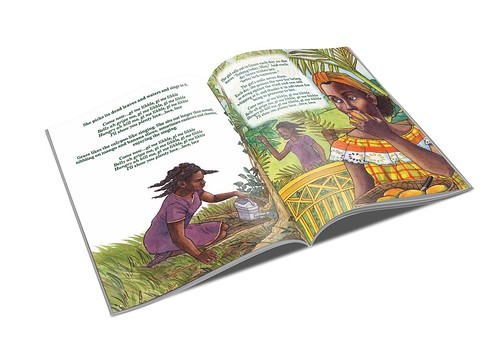
Here's the thing though, just because it's written for little Caribbean girls doesn't mean that With Grace is limited to little Caribbean girls. Because if we Caribbean girls who grew up on stories from Denmark's Hans Christian Anderson, Germany's Grimms Brothers, England's Enid Blyton, America's Walt Disney, and Anansi from the Ashanti people of Africa (yes, we managed to hold on to some of ourselves) have learned anything about fairytales, it's that they travel – they travel through time, across the water, from hand to hand, from imagination to imagination down the generations. And just as it's important for little black girls and brown girls and other girls and boys on the fringe of Western imagination and – unfortunately – publishing to see themselves, it's important for those who typically hog the spotlight to see other types of stories as well, from the time they are young (and old) enough to know that stories exist, to see other types of people are not Other – different but not Other, not to be shunted to the side, demonized, or feared. But free to live, to sing, to tell, and star in their own stories.
With all of this subversion, does With Grace - the story of a girl who crests a hill and approaches a miserly woman for a chance - have a typical fairytale happy ending or does it curve a different way? You'll have to read to find out.
With Grace is available online (at Amazon and other online retailers, and can be in your local bookstore if you ask for it). The publisher is Little Bell Caribbean, based in New York.
With Grace is Antiguan and Barbudan/Caribbean author Joanne C. Hillhouse's sixth book, second children's picture book, and first fairytale. Of her previous book Musical Youth, a finalist for the Burt Award for teen/Young Adult Caribbean literature, Dr. Jessie Voigts wrote on Wandering Educators, "When I read her words, I am transported - to another time, place, culture. She is a wordsmith, bringing the Caribbean island of Antigua to life for her readers." Joanne hopes that readers – albeit younger readers – are similarly transported by With Grace. Follow her at http://www.facebook.com/JoanneCHillhouse
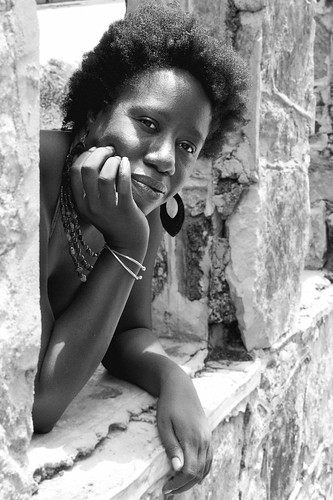
Joanne C. Hillhouse is a writer from Ottos, Antigua, in the Caribbean. She writes across genres. Her published books are The Boy from Willow Bend, Dancing Nude in the Moonlight (see 10th Anniversary Edition and Other Writings), Oh Gad!, Musical Youth, Fish Outta Water, and With Grace. She's also been published in various international journals and anthologies. Joanne freelances as a writer, editor, writing coach, and workshop facilitator, and in her off time runs the Wadadli Youth Pen Prize (wadadlipen.wordpress.com) to nurture and showcase the literary arts in Antigua and Barbuda. For more, visit https://jhohadli.wordpress.com/books
